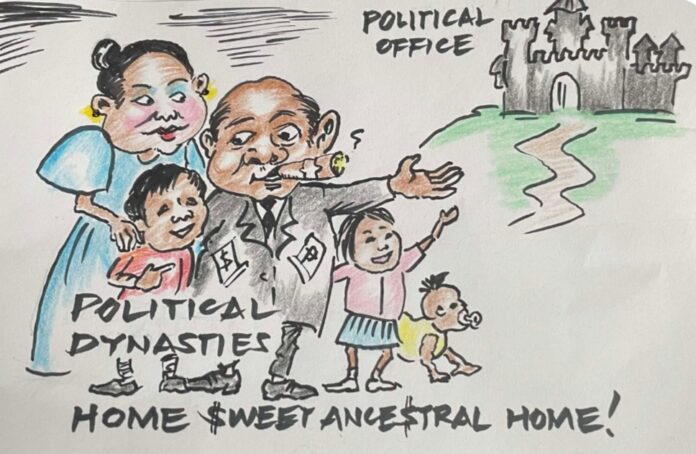By Mia Magdalena Fokno
As the Philippines approaches the 2025 midterm elections, a critical petition has been filed before the Supreme Court that could alter the country’s political landscape. Four Filipino citizens, all classmates from the University of the Philippines (UP) College of Law Class of 1976 – Wilfredo M. Trinidad, Rico V. Domingo, Jorge L. Cabildo, and Ceasar G. Oracion – are seeking to compel Congress to pass a law prohibiting political dynasties, which is a 37-year-old unfulfilled constitutional mandate.
Their petition for a Writ of Mandamus, filed on March 19, 2024, highlights Congress’ failure to enact a law defining and prohibiting political dynasties, a measure that the 1987 Constitution mandates under Article II, Section 26. The provision clearly states:
“The State shall guarantee equal access to opportunities for public service and prohibit political dynasties as may be defined by law.”
The petitioners argue that the failure of Congress to enact this law has allowed political dynasties to thrive unchecked, perpetuating inequality and narrowing access to public office for ordinary citizens. This failure, they emphasize, is a violation of the Constitution, which requires legislative action to define and prohibit such dynasties.
Political Dynasties in the 2025 Midterms
The upcoming midterm elections are once again set to be dominated by familiar political clans. Among them, the Marcos, Duterte, Villar, and Cayetano families are fielding multiple candidates across various local and national positions. Former President Rodrigo Duterte is eyeing a return to Davao City’s mayoral seat, while his daughter, Vice President Sara Duterte, remains a powerful force despite internal family rifts. The Villar family, one of the most powerful dynasties in Philippine politics, is no exception. Camille Villar, currently the representative for Las Piñas, has filed her candidacy for a Senate seat, aiming to join her brother Mark Villar, a sitting senator, in the upper chamber. Their mother, Cynthia Villar, is concluding her Senate term and is seeking to return to the House of Representatives, continuing the family’s stronghold in politics.
This trend of dynastic dominance is mirrored across other powerful political families. Studies by various institutions, such as the Ateneo School of Government, reveal that political dynasties dominate over 70% of Congress. This has led to concerns that dynastic control stifles political competition, impedes progressive reform, and limits opportunities for new leaders to emerge.
The Petitioners’ Call for Action
The petitioners argue that Congress’ decades-long failure to pass an anti-dynasty law has resulted in widespread public distrust in the democratic process. They emphasize that without legislative action, the political landscape will continue to be monopolized by a few powerful families, effectively excluding qualified individuals from public service.
“Congress has had ample time to act, but it has failed to do so for over three decades. This inaction not only betrays the people’s trust but also perpetuates a system where a few families control the majority of political power,” the petition states.
A Defining Moment for Philippine Democracy
The Supreme Court’s decision on the petition could have profound implications for the country’s political future. Should the Court grant the Writ of Mandamus, it would compel Congress to finally pass the long-delayed law, potentially reshaping the 2025 midterms and future elections by leveling the playing field for non-dynastic candidates. However, many remain skeptical, as dynastic interests have proven resilient to reform efforts in the past, including initiatives led by lawmakers such as Senator Miriam Defensor Santiago and Senator Grace Poe.
The midterm elections, set for May 2025, will once again test the strength of political dynasties. With dynastic families entrenched in both national and local politics, the question remains: Will the Supreme Court act in time to uphold the constitutional prohibition on dynasties, or will the same political names continue to dominate the ballots?
For now, the nation watches closely as the case unfolds, hoping for change that will break the long-standing hold of dynasties on Philippine politics.###

